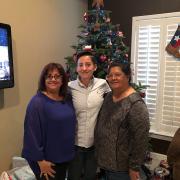
“My mother ended up interpreting for me: music and conversations,” Diego said. “My mom would interpret when I wanted to communicate with a cousin. Some family would gesture with me, some signed a few little signs.”
However, after their mother passed away, Diego suddenly felt cut off and isolated during those family gatherings. They could read lips, but lip-reading is an imperfect art, especially as family members would quickly switch from English to Spanish and back.
Some family members made an effort. Diego said they came up with games that didn’t require spoken English, like dice and card games. And, some wrote things down or sent text messages.
“I felt included, but not always,” Diego said. “So, I just decided to hang out with people whom I was closer to.”
Diego’s story resonates with many in the deaf community, who often feel isolated and outcast when they go home for the holidays.
“More than 90% of deaf children are born to hearing parents, like Diego and me,” said NDC Director Stephanie Cawthon, PhD. “Without other deaf relatives, the communication barriers can be significant.”
They don’t have to be. If you have a deaf family member or will be hosting a deaf guest, NDC has resources and elearning courses that can help you ensure they feel accepted and included this holiday season.
Here are some quick tips to help you include a deaf guest in your holiday celebrations.
Involve them
Many hearing people will simply ignore a deaf person. There are many ways to communicate, even if you don’t sign. Use a visual cue or tap the deaf person gently to get their attention, and interact with them directly. Use gestures and facial expressions to convey meaning.
Diego said they would have appreciated family members asking more questions, beyond simple small talk. They said they felt especially left out when someone would tell a joke.
“I wish sometimes people would give me the whole joke,” Diego said. “They would tell me ‘oh, hold on a second,’ then they would give me the brief version. I would only get the gist. I wanted the details.”
Educate yourself
Enroll in Deaf 101, an online course that provides basic knowledge and tools necessary to communicate effectively with deaf people. It’s self-paced, and is typically completed in about three hours. Best of all, it’s completely free.
Eyeball the environment
Deaf people rely on what they can see to understand conversation and other context. Ensure the space for your gathering is well-lit and does not have a lot of visual barriers. This will not only foster communication, but reduce eye-strain.
Remove large centerpieces or table decorations that might make it hard to see other guests. If people are sitting in front of windows, close the curtains to avoid too much backlighting. Bring in extra lamps to brighten up a dark space.
Turn on the captions
Be mindful if you’re watching the big game or a holiday parade as part of your celebrations to include deaf guests. Avoid awkwardly fumbling through your television’s settings during your show by turning on closed captioning before your guests arrive.
Captions help deaf people follow what is happening on the television, especially in a noisy or busy environment, such as a large family gathering. As an added bonus, they can be beneficial for your hearing guests, too.
Hire a professional
Hire an interpreter or use a qualified speech-to-text service. If you’re considering a professional service, be sure to include the deaf person in the choice. Each deaf person has their own strengths and preferences. What works for one may not work for another.
If cost is an issue, do some research. There may be pro-bono services available. See if there’s an ASL interpreter program in your area whose students may be willing to help out. Consider splitting the cost with other guests.
Use what you have
If professional services are not feasible, look for other options. Even downloading a phone app that transcribes speech could be helpful, if imperfect. Have a notepad and pen or small whiteboard available to write down questions or requests. Use text messaging to communicate.
Play deaf-friendly games
Avoid any games or group activities that are heavily dependent on oral cues. Instead, choose deaf-friendly games that rely more on visual cues or physical competition.
Check in and ask questions
Not sure what you can do? Reach out to the deaf person directly and ask questions, such as “How do you prefer to communicate?” or “What can I do differently to better communicate?”








